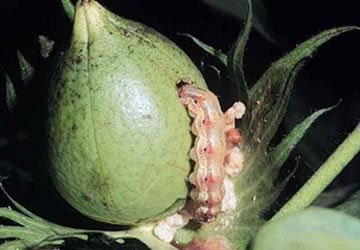Genetically modified insects threaten genetically modified plants
The situation of genetically modified insects to adapt to genetically modified crops in the field is more complicated in the laboratory, a new study has said.

Cotton bollworms are adapting to genetically modified cotton. (Source: Leedsblogs)
Laboratory tests were conducted to find ways to prevent crop pests from being resistant to genetically modified crops. However, those experiments did not fully measure the situation in the field.
Haonan Zhang scientist at Nanjing Agricultural University (China) and colleagues examined gene variants in cotton bollworms that they caught from genetically modified cotton fields in northern China. They found that cotton borer has a rich number of genetic variants, which helps them survive in genetically modified plants.
In addition to the recessive gene variants observed in the previous laboratory, the scientists also discovered many dominant gene variants, able to resist the genetically engineered toxins produced to kill the worm larvae. harm.
This means that only a single copy of the gene mutates well enough for the pest to pass on the trait of transgenic plants to the next generation.
In addition, the usual method of growing plants around genetically modified plants - so that non-genetically modified insects develop and combine genetically modified insects and thereby reduce the number of transgenic insects - ineffective. As expected.
According to Bruce Tabashnik, head of entomology at Arizona University and co-author of the study, in addition to known gene mutations, the team found 'many gene mutations. Most of these mutations are in the same gene, but there is a genetic mutation that comes from a completely different gene. '
- Genetically modified plants still cause doubts
- Genetically modified plants and the future in Vietnam
- Scary effects of genetically modified plants
- Use genetically modified insects to replace chemicals
- The most common genetically modified foods
- Scientists warn about the reverse side of transgenic plants
- In 2011 began planting genetically modified plants
- Genetically modified carrots resist flu
- Genetically modified food in Vietnam ever since?
- Genetically modified corn is ineffective
- Using genetically modified foods is prone to cancer
- Legislation of genetically modified corn harmful
 Why do potatoes have eyes?
Why do potatoes have eyes? 'Tragedy' the world's largest carnivorous life: Death becomes ... public toilet
'Tragedy' the world's largest carnivorous life: Death becomes ... public toilet Tomatoes were once considered 'poisonous' for 200 years
Tomatoes were once considered 'poisonous' for 200 years Detecting microscopic parasites on human face
Detecting microscopic parasites on human face